Movie Review – Contact (1997)
Zemeckis’ predilection for visual effects almost overcome this terrifically acted dramatic work, as the search for extraterrestrial life reaches a pivotal moment in human history. Spiced with some delicious thematic material about faith, science and the grey area in between, Contact works as both a straight-up fictional drama, and as an examination on what might happen the day we learn we’re not alone in the universe.
– Summary –
Director : Robert Zemeckis
Year Of Release : 1997
Principal Cast : Jodie Foster, Matthew McConnaughey, Jena Malone, James Woods, Tom Skerritt, William Fichtner, John Hurt, Angela Bassett, David Morse, Jake Busey, Rob Lowe, Geoffrey Blake, Max Martini.
Approx Running Time : 150 Minutes
Synopsis: A scientist discovers a message sent from beyond the stars, and learns that within it, the ability to travel through interstellar space is introduced – the race is on to find the lucky person who will represent humanity to our first encounter with alien life.
What we think : Zemeckis’ predilection for visual effects almost overcome this terrifically acted dramatic work, as the search for extraterrestrial life reaches a pivotal moment in human history. Spiced with some delicious thematic material about faith, science and the grey area in between, Contact works as both a straight-up fictional drama, and as an examination on what might happen the day we learn we’re not alone in the universe.
**********************
“If it is just us….. what an awfully big waste of space…”
Since humans first gazed upwards at the moon and stars, and wondered what was out there, we’ve constantly had a fixation with all things universal. From exploring our immediate planetary neighbors, such as our Moon, Mars, and planets beyond, to sending equipment beyond the borders of our solar system and into the furthest reaches, as well as building telescopes which allow us greater vision into distant systems of nebulae and supernovae, humanity’s quest for greater understanding of our place in the universe has never waned. Untold trillions of dollars have been spent in the name of research into extraterrestrial activity – from finding water on Mars to hopefully, one day, discovering life on another world. Here on Earth, entire subcultures exist dealing with the concept of extraterrestrial life visiting us, the idea of UFO’s and “the Government” covering this all up. Hollywood has promulgated various ideas about aliens – be they benevolent or aggressive – and society, for the most part, tends to look upon the idea of alien visitation not as a question of if, but more like when. Contact, released in 1997 and directed by Who Framed Roger Rabbit helmer Robert Zemeckis, digs a little deeper into alien communication than simply exploding buildings and human decimation, attempting to infuse real-world possibilities of the scenario with the idea that faith in God (or other supreme deity), something the vast majority of humanity has, works counter-intuitively to it.

Doctor Ellie Arroway (Jodie Foster) is firmly obsessed with listening for signs of alien life or intelligence in outer space. A grant allows her to use the observatory in Arecibo, Puerto Rico, to try and make a breakthrough discovery, to the chagrin of Presidential Science Adviser David Drumlin (Tom Skerritt), who pulls her funding. Ellie finds further funding from billionaire entrepreneur and businessman SR Haddin (John Hurt), and is granted access to continue her research at New Mexico’s VLA. Ellie meets and begins a short-lived romantic relationship with Palmer Joss (Matthew McConnaughey), himself a spiritual advisor to the US President. When Ellie locates a signal of alien origin, however, she finds herself pushed to the background of the story as Drumlin, as well as National Security Adviser Kitz (James Woods) and Chief Of Staff Rachel Constantine (Angela Bassett) try to decide if the signal constitues a threat. With the world looking on, the signal, which includes part of Hitler’s opening address at the 1936 Olympic Games, is decoded; hidden within the information are plans to build an enormous machine, the purpose of which is tentatively decided to be a transport mechanism of some kind. Ellie, along with Drumlin and a nimber of others, are put up as candidates to be the one who enters the machine as a representative of humanity, to “meet” the aliens and gain an understanding of extraterrestrial life. Questions of faith and responsibility hamper Ellie’s stance on the purpose of the signal and the construction of the machine, while religious conservatives question the very ethics of building it.
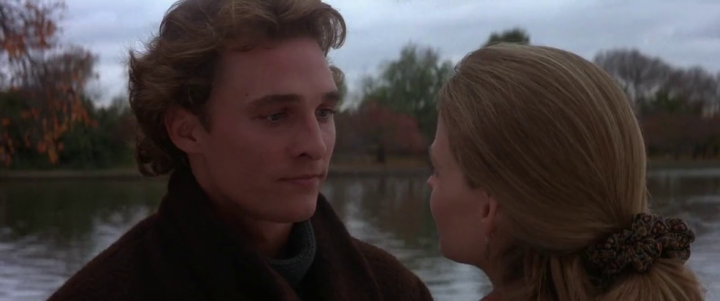
This review contains spoilers.
Contact is based upon the original film screenplay, and subsequent 1985 novel of the same name, by US astrophysicist, astronomer and cosmologist Carl Sagan. Sagan, who died in December 1996, barely seven months prior to the film’s release, was a polular figure in the scientific community as well as with the public, through his television series Cosmos, and is given a tip-o-the-hat in the moments before the closing credits; some have labelled this film “divisive” and “controversial”, both of which are probably true, although even in spite of its scientific and religious themes, remains a pulse-pounding roller-coaster of pop-culture and subterfuge, a railing against “authority” who threaten to clamp down on discovery in the name of “national security” or “avoiding a panic”. The film offers some criticism on both sides of the science-vs-religion debate – science often being accused of trying to (dis)prove the existence of God, while religion discounting the proven facts of science. While the crux of the narrative lies in Ellie’s journey through her lack of “faith” in God via her belief in science as indisputable fact (a tenet not dissimilar to that of Sagan himself), there are numerous references to spirituality and the dichotomy of man’s dilemma in reconciling the two as being less a conflict and more a ground for discourse on our very nature, and purpose.
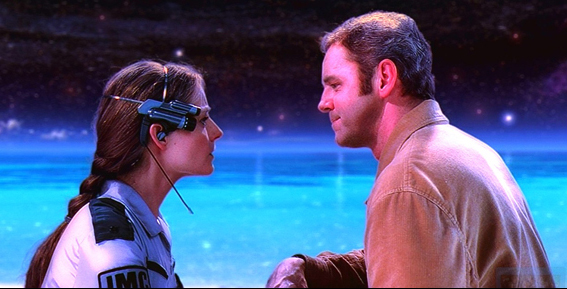
Religious and sciencey debate aside, Contact is thrilling, exciting, and often awe-inspiring. While the technology in the film might have dated somewhat, the visual effects and Zemeckis’ use of them throughout almost every shot remain nothing short of brilliant. A few seams show up on HD displays nowadays, the green-screen and roto-scoping work not quite as on-par as more recent cinematic work, but the impact is nonetheless startling. From the brain-bending shot of a young Ellie (played by Jena Malone in an early role) running to the medicine cabinet to save her dying father (for the camera to come out of the mirror in reverse when she approaches it, a moebius strip of an effect that still makes me boggle), to the climactic moments on board the Machine and inside the Pod (which carries Ellie through a wormhole to an alien world), to the morphing brilliance of Foster and Malone’s faces as Ellie has an epiphany as she witnesses the true beauty of the Universe, Contact relies heavily on its visual effects. Zemeckis’ use of television screens, filmed concurrently with the framing of the camera, are also well done in moving the narrative forward, as time is compressed thanks to a running commentary from the talking heads on CNN. Apparently, in Contact-world, CNN are the only news network worth a look-in.
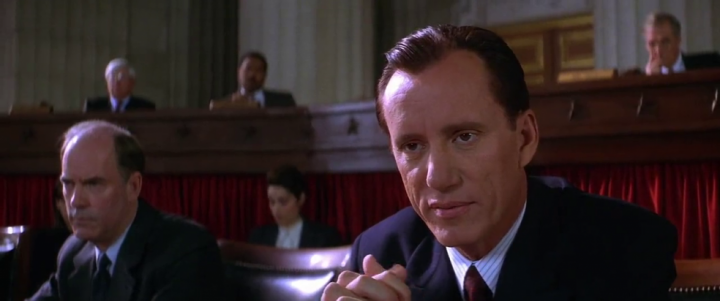
The film’s opening three minute visual effects shot, of a long, long pull-back from Earth out into the cosmos, is stunning, as the radio soundtrack becomes more and more historic the further we get from our world. Almost every shot in the film contains some kind of digital trickery, or manifestation of the same, a factor that some have thought actually pulls you out of the viewing experience with that “look, it’s another visual effect” cheapness that wears out as time goes on. To be honest, I can agree with that sentiment to a point, in the fact that a lot of the visual effects appear to exist purely for the sake of it rather than to really propel the story, but there’s still a lot here that could only have been done with the aid of computers. The entire Machine sequence, for example, and “wormhole” scene, would have been impossibly to pull off entirely practically, so in terms of Zemeckis using his skills for CG with that, I’m in agreement. The final “meeting” scene, between Ellie and the entity at the end of the wormhole, has been derided by many as a cheap cop-out – Ellie travels all the way across the galaxy to meet…. her dead dad? While one might think it’s just a cheap way of not having to introduce an genuine extraterrestrial character, I always found that by not revealing some bug-eyed monster, and having the benevolent aliens try and help Ellie acclimatize to her journey, it opens the ending up to all manner of interpretation. The film is pretty decisive in its reluctance to confirm Ellie’s journey one way or the other – although a hint of its legitimacy is given in one of the film’s final key scenes, between James Woods and Angela Bassett – and I think it’s this element that caused so much resentment among audiences; after all, if it’s a film about alien contact and you don’t show the aliens, isn’t that just gypping the audience out of their money? Frankly, I think the intellectual conversation this film inspires is infinitely more impressive than whether or not the aliens appear in the form of a lost parent. That could be just me.
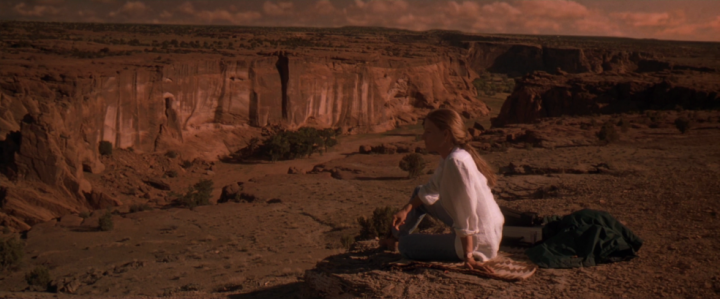
Jodie Foster delivers a magnetic, empathetic, solitary look at one woman’s obsession with space, the isolation she feels in her own life somewhat mirroring the journey humanity has had thinking itself to be the solitary intelligent life in the galaxy. Arroway is a complex character for Foster, who really morphs into the role, and I think of all her film roles in recent times, this is perhaps her most memorable. It’s certainly a bravura performance, and Foster’s palpable tension, fear, love and anger as the progresses through this film is remarkable. Her co-star, the oft-missing Matthew McConnaughey, also a delight, although his role is limited to a more reduced counterpoint example of how religion perceives the scientific community. McConnaughey is solid, but his material isn’t as demanding as that of Fosters. It’s the second-tier characters that stick in the mind long after the film finishes – Tom Skerritt’s back-stabbing scientific dude almost becomes the “boo-hiss” variety early, while James Wood’s snakey, snarling NSA role has the hallmarks of a James Bond villain. William Fichtner does nicely as a blind associate of Ellie’s, although he, like McConnaughey, goes missing from large portions of the film. Angela Bassett pops up as an aide to the US President (played by the real-life Bill Clinton, in archival footage which dates the film considerably), and David Morse is good in a small-but-pivotal role as Ellie’s father, but the scene-stealers for me are both Jake Busey as a religious nutter who threatens the Machine, and John Hurt as the Doctor Evil-esque Haddin, the man pulling the puppet strings on the whole endeavor. Busey’s role is pivotal and entirely memorable (man, he looks so creepy!), while Hurt gives the impression of being a grandfatherly pedophile with his bald cap and leering, uber-freaky glasses, not to mention his fantastic and distinctive voice.
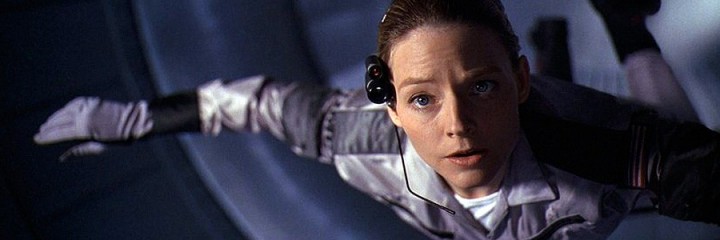
For me, Contact is a guilty pleasure movie. It’s a good one to show somebody who has an interest in science, or is of faith, to spark a dialogue about the very nature of humanity and what it means to be human. You get a great Jodie Foster performance thrown in, too. Detractors would scoff at the film’s tepid examination of faith in the face of evidence of alien life (God created Man in His image, so in whose image did he create an organism or life-form from another planet?) but I think the broader picture is too big to ignore as mere Hollywood glamor. The film can’t quite subvert the entertainment factor over its discussion on science versus religion, but I don’t think I’ve seen a film before or since at least try and tackle the concepts with as much honesty and honesty as Contact does. You might disagree, but in doing so you’ll be forced to confront the very notions Contact puts forth as a central conceit of the movie itself. Contact is brilliant film-making that’s more than just another summer blockbuster. It’s a real tour-de-force.


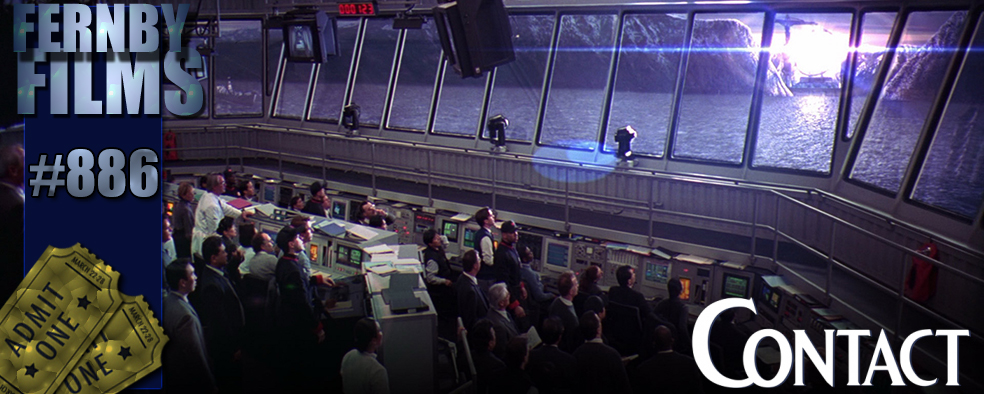
 Contact ✭✭✭✭
Contact ✭✭✭✭



 Review – Under the Skin
Review – Under the Skin
Every time I see a star-lit sky I think of this film. I love its sense of awe in the universe, driven by Jodie Foster's Ellie Arroway. I love this film like I do most of director Zemeckis' work. Good review Rodney.
My recent post Top 10 Films of Dennis Hopper
Thanks Dan! I too often this of this movie when I'm watching the stars with the kids. Like the line goes: if it is just us, seems like an awfully big waste of space.